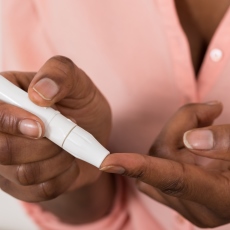
What is blood glucose?
Blood glucose, or blood sugar, is the main sugar found in your blood. It is your body's primary source of energy. It comes from the food you eat. Your body breaks down most of that food into glucose and releases it into your bloodstream. When your blood glucose goes up, it signals your pancreas to release insulin. Insulin is a hormone that helps the glucose get into your cells to be used for energy.
What is diabetes?
Diabetes is a disease in which your blood glucose levels are too high. When you have diabetes, your body doesn't make enough insulin, can't use it as well as it should, or both. Too much glucose stays in your blood and doesn't reach your cells. Over time, having too much glucose in your blood can cause serious health problems (diabetes complications). So if you have diabetes, it's important to keep your blood glucose levels within your target range.What are blood glucose targets?
- Blood Glucose (National Library of Medicine)What is blood glucose? Blood glucose, or blood sugar, is the main sugar found in your blood. It is your body's primary source of energy. It comes from the food you eat. ...
- Hyperglycemia (National Library of Medicine)What is blood glucose? Blood glucose, or blood sugar, is the main sugar found in your blood. It is your body's primary source of energy. It comes from the food you eat. ...
- Hypoglycemia (National Library of Medicine)What is blood glucose? Blood glucose, or blood sugar, is the main sugar found in your blood. It is your body's primary source of energy. It comes from the food you eat. ...
- A blood sugar test measures the amount of a sugar called glucose in a sample of your blood. Glucose is ... than likely, the provider will order a fasting blood sugar test. The blood glucose test is also used ...
- ... diabetes, you should have good control of your blood sugar (glucose). If your blood sugar is not controlled, serious health problems called complications ...
- High blood sugar is also called high blood glucose, or hyperglycemia. High blood sugar almost always happens in people who have diabetes. ...
- Checking your blood sugar levels often and recording the results will tell you how well you are managing your diabetes so you ... as possible. The best times to check your blood sugar are before meals and at bedtime. Your blood ...
- If you have diabetes, check your blood sugar level as often as instructed by your health care provider. Record the results. This will tell you how well you are managing ...
- Low blood sugar is a condition that occurs when your blood sugar (glucose) is lower than normal. Low blood sugar may occur in people with diabetes who are ...
- Hyperglycemia is abnormally high blood sugar. The medical term for blood sugar is blood glucose. This article discusses hyperglycemia in infants. Hyperglycemia can occur at any ...



